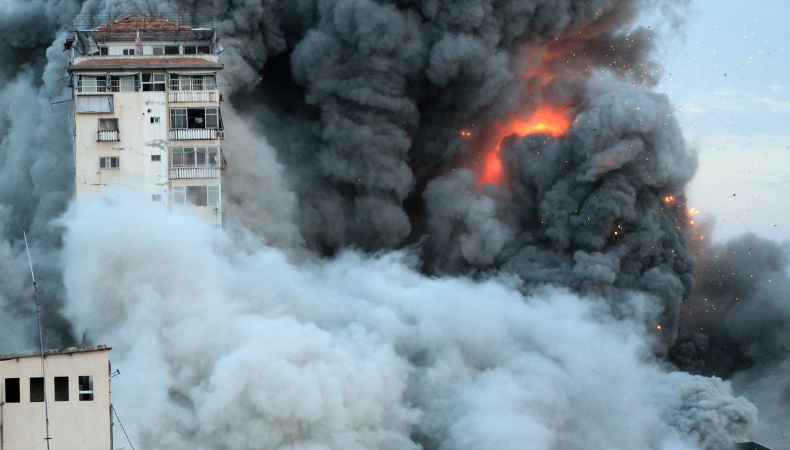Is the Middle East on the Brink of War?

On Saturday, Middle Eastern tensions peaked as Iran and her supporters got ready to react to the murder of senior leader of Hamas, an act ascribed to Israel. The killing has spurred worries about a more general regional conflict. While Western nations advised their nationals in Lebanon to go, the United States, a friend of Israel, declared intentions to send warships and fighter planes to the region. This results from airlines starting to cancel flights in reaction to the increasing turbulence.
A List of Escalations
Both atrocities attributed on Israel, the murder of Hezbollah’s military chief in Beirut and the death of Hamas leader Ismail Haniyeh in Tehran followed. Iran-backed forces from Lebanon, Yemen, Iraq, and Syria have progressively become involved in the almost 10-month-long battle between Israel and the Palestinian militant group Hamas following these events, hence triggering promises of revenge from Iran and the “axis of resistance.”
Israel maintained its aggressive posture on Saturday, fighting Hezbollah, launching a deadly attack on the occupied West Bank, and focusing on a school compound in Gaza City, thereby killing at least 17 people according Gaza’s civil defense service. With Israel saying these sites were utilized by militants—an allegation Hamas denies—the continuous battle has seen many schools, converted as displacement shelters, attacked by strikes.
Reactions and Alerts from Around the World
Iran has sent messages asking Hezbollah to go beyond only military objectives and into further into Israeli territory. The Pentagon has responded by bolstering its presence in the Middle East to protect US personnel and assist Israel. Along with extra ballistic missile defense-capable cruisers and destroyers, the deployment consists in the aircraft carrier strike group headed by the USS Abraham Lincoln.
Regarding Iran’s possible reaction, US President Joe Biden answered with hope but uncertainty: “I hope so, I don’t know.”
After an Israeli attack on Kfar Kela and Deir Siriane in southern Lebanon allegedly resulted in civilian casualties, Hezbollah responded with hundreds of Katyusha rockets aimed toward the northern Israeli village of Beit Hillel. Hezbollah stated earlier in the day two of its fighters—including a 17-year-old—had died in Deir Siriane.
Public Mood and Evacuations
The state of affairs in Lebanon has created great population concern. Twenty-year-old student Diana Abu Aasel said, “If there is war, I don’t think I will be able to bear staying,” in Lebanon expressing concern for the safety of her family.
Large-scale demonstrations against Haniyeh’s murder and showing support for Palestinians occurred in Turkey, Morocco, and Jordan. Particularly as it followed the murder of Hezbollah’s military commander, Fuad Shukr, near Beirut, Haniyeh’s death heightened concerns of regional violence.
Suggestions and Military Strategies
Strong advice on leaving Lebanon right away has come from the UK and the US for their nationals. Israeli official numbers indicate that the fighting has now claimed 1,197 lives, largely among civilians. Of the 251 hostages captured by militants, 111 of them remain in Gaza and 39 are apparently dead.
Gaza’s health ministry estimates that Israel’s military operation there has claimed at least 39,550 lives. The murder of Haniyeh, a major negotiator in attempts to bring the crisis to a close, begs serious questions regarding the feasibility of continuous mediation initiatives by Qatar, Egypt, and the US.
Political Effects
Officials from Hamas and some commentators have charged Israeli Prime Minister Benjamin Netanyahu with extending the conflict to guarantee the rule of his hard-right government. Protests in various Israeli communities have spurred demands for a compromise involving a hostage release.
Health Crisis and Humanitarian Issues
Almost the whole population has been displaced and great damage done by the Gaza war. With almost 40,000 instances of Hepatitis A since the war started, the UN finds worsening public health conditions driven on by contaminated food and water.
Supporting Hamas are Hezbollah’s almost daily cross-border interactions with Israeli forces. The rising tension has caused some airlines to suspend flights to Beirut and Tel Aviv. Turkish Airlines has canceled night flights to Tehran for the second running; Air France and Transavia France have stopped flights to Beirut until at least Tuesday.




